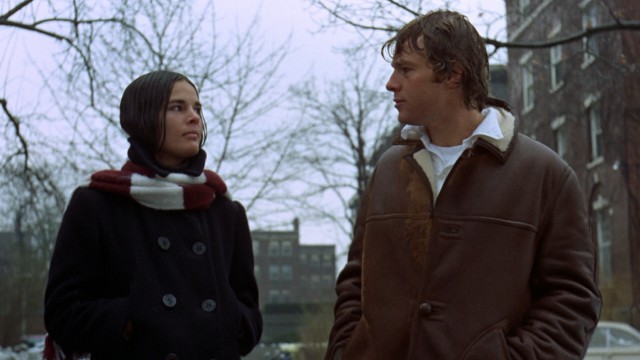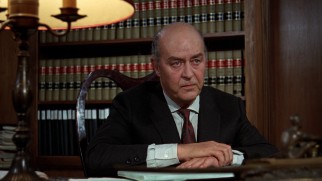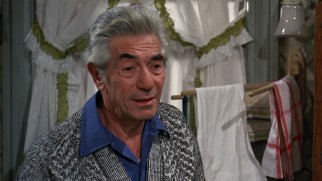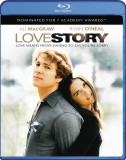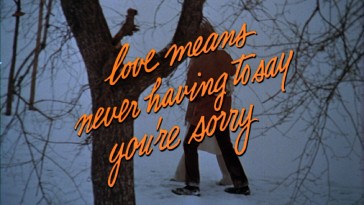Love Story Blu-ray Review
 |
Love Story
Theatrical Release: December 16, 1970 / Running Time: 100 Minutes / Rating: PG Director: Arthur Hiller / Writer: Erich Segal Cast: Ali MacGraw (Jennifer Cavalleri), Ryan O'Neal (Oliver Barrett IV), John Marley (Phil Cavalleri), Ray Milland (Oliver Barrett III), Russell Nype (Dean Thompson), Katherine Balfour (Mrs. Barrett), Sydney Walker (Dr. Shapeley), Robert Modica (Dr. Addison), Walker Daniels (Ray Stratton), Tommy Lee Jones (Hank), John Merensky (Steve), Andrew Duncan (Rev. Blauvelt), Julie Garfield (Bystander) |
Buy Love Story from Amazon.com: Blu-ray • DVD • Instant Video
Though the public's tastes are always changing, look at the all-time box office hits and for almost every blockbuster, you can find a comparable success from another era. I'm not even talking in general terms, such as likening the hero's journey of Star Wars to Harry Potter. Before Gladiator, an ancient slave's rising through spectacle was seen in Ben-Hur. Before three men got in over their heads with a baby in The Hangover, there was Three Men and a Baby. Between sequels and remakes and specific genres, there are tons of more obvious connections too.
I don't know that there is a clear modern-day parallel to Love Story. This tale of two college students from different socio-economic classes who fall for each other was one of the biggest hits of all time; its $106.4 domestic gross in 1970-71 translates to a staggering $556 M today adjusted for inflation. You know how Love Story will end, if not from hearing about it at some point over the past forty years, then in what the film's opening tells you. But such sadness must wait a good seventy minutes. The film first takes us back to the library meeting of Harvard University hockey player Oliver Barrett IV (Ryan O'Neal) and Radcliffe College music student Jennifer Cavalleri (Ali MacGraw). The initial encounters unfold with Jenny sending plenty of sass in the Ivy Leaguer's direction. But she attends his games and eventually admits that she cares for him as he cares for her.
Before long, the talk turns to marriage, although that subject raises some red flags. Oliver, after all, comes from money; a building carries the family name and represents a legacy of well-to-do WASP Harvard graduates. Jenny, on the other hand, is middle class, the daughter of a Rhode Island bakery owner and a Catholic, to boot. Strong-willed Oliver shuns his father's warning and marries Jennifer in a non-denominational ceremony that Jenny's accepting father (an Oscar-nominated John Marley, later the abrasive studio mogul Jack Woltz in The Godfather) uncomfortably attends and approves of. Without access to his family riches, Oliver and private school teacher Jenny have to work extra hard to make ends meet, the former requesting financial aid and both taking odd jobs. After Oliver graduates third in his Harvard Law School class and lands a big-time job in New York City, the young couple seems to have made it. But their attempts to conceive a child bring bad news; Jenny is diagnosed with an unstated fatal illness.
You can accuse Love Story of being sentimental and manipulative, but it seems to earn the right to those qualities in its earnest first 70 minutes before you're to get all teary-eyed. In fact, the film's reputation as one of cinema's all-time greatest tearjerkers seems a bit overstated and unfair. It doesn't lose its head or cheat its way to emotional power; you are moved not by a sudden reminder of mortality and life's unpredictability but from having warmed to these two utterly human characters through years of experiences. By treating you to the good times and the bad times (and clearly with such an unwavering love, the bad times are awfully good as well), the film gets you to invest absolutely in the two halves that comprise this relationship.
You can pick apart the storybook romance as unrealistic, its biggest obstacle being seemingly self-imposed estrangement. We don't get an abundance of scenes of Oliver and Jenny apart or interacting with anyone but their fathers. But their intimate moments together feel sincere and sweet, not sugary or trite. To Baby Boomers, this was the realest and purest depiction of love, more meaningful than Romeo & Juliet and more lifelike than West Side Story.
This romantic drama was recognized as more than just an extremely popular sensation. It earned seven Academy Award nominations. And though it lost in all six of its major categories (Picture, Actor, Actress, Supporting Actor, Director, and Original Screenplay), it didn't go home entirely empty-handed, winning Best Original Score for Frenchman Francis Lai's prominent and ultimately best-selling compositions. Upon the film's success, the instrumental theme was fitted with lyrics sung by Andy Williams. "(Where Do I Begin?) Love Story" soared to the top of Billboard's adult contemporary chart and has subsequently been covered by dozens of other artists.
Today, Love Story is remembered more as a popular film than a great one, but it remains poignant even in a critical viewing. Canadian director Arthur Hiller, who helmed a number of familiar comedies (including the Richard Pryor/Gene Wilder comedies Silver Streak and See No Evil, Hear No Evil) but nothing with as much impact, imbues the film with thoughtfulness and candor. He follows the couple around, favoring long takes that make you forget you're watching scripted dialogue performed and feel like you're observing an actual young couple truly in love (as corny as that sounds).
Stars O'Neal and MacGraw, who were 28 and 30, respectively, during filming never repeated this success. O'Neal did get some pretty good work, appearing alongside Barbra Streisand in the screwball comedy What's Up, Doc? and his daughter Tatum, whose Oscar-winning performance at age 10 set a record, in the esteemed Paper Moon, both for director Peter Bogdanovich. The elder O'Neal also held the title role in Barry Lyndon, the most decorated film of Stanley Kubrick's career. In 1978, O'Neal reprised the character of Oliver Barrett IV in the questionable sequel Oliver's Story across from Candice Bergen. It's largely been downhill since then with a series of well-documented estrangements and problems.
MacGraw, meanwhile, appeared in The Getaway, subsequently leaving her second husband (Paramount head Robert Evans) and marrying her co-star, Steve McQueen, and stepping away from the spotlight. She returned to acting after their 1978 divorce, but only briefly, the height of which may have been her 14-episode 1985 stint on "Dynasty." She too has had her fair share of personal and substance problems.
Love Story has continued to be recognized, with its most famous line (the repeated "Love means never having to say you're sorry") ranking thirteenth on the American Film Institute's 2003 "100 Years... 100 Movie Quotes" list and the film coming in on at #9 in 2002's "100 Years... 100 Passions" countdown. Today, a week before Valentine's Day, the movie becomes Paramount's catalog Blu-ray debut for the month of February.
While Love Story is rated PG, the modern equivalent of its original GP rating, don't assume that means it's a family film. In fact, it's quite full of profanity, albeit mostly of the milder variety you can easily hear on network television these days. Such language was a relatively new phenomenon for cinema back in 1970 and it would seem to translate to a PG-13, but the MPAA gave it a PG "for language and a scene of love" back in 2000, the same classification it regularly gives to animated movies these days.
VIDEO and AUDIO Love Story looks quite good on Blu-ray. Clearly, this wasn't a hugely budgeted film and thus it has the grit and grain of most '70s cinema. But, the 1.78:1 widescreen presentation is as clean, detailed, and stable as it can be while remaining true to the original look. Though the packaging claims the disc only contains mono soundtracks, there is in fact a 5.1 DTS-HD master audio mix as default. The track springs to life in hockey scenes and also uses the surround channels to distribute Francis Lai's score. For the most part, the film is pretty basic, but all of the dialogue that drives it remains crisp and clear. A more faithful Dolby Digital 2.0 monaural mix is provided in English, French, and Portuguese.
BONUS FEATURES, MENUS, PACKAGING and DESIGN On Blu-ray, Love Story is joined by the same three bonus features that appeared on its 2001 DVD. First and longest is an audio commentary by director Arthur Hiller. He remembers the production in detail, sharing many specifics on filming locations and circumstances. The narrated retrospective "Love Story: A Classic Remembered" (14:51) has the feel of a turn-of-the-millennium featurette, just predating when such things became the norm. Repeating a number of his commentary highlights, Hiller recalls being offered the picture (as well as The Godfather), casting the parts (including Tommy Lee Jones, who makes his film debut here), and reshoots and edits that strengthened the film. The piece makes liberal use of 1.33:1 film clips and also features a handful of behind-the-scenes photos. The input of the lead actors and since deceased screenwriter Erich Segal is missed, but Hiller does okay on his own. Finally, we get the film's original theatrical trailer (2:57) in HD. It does little more than set still frames to the film's score, tacking on a list of its seven Academy Award nominations at the end. Considering the film's tremendous box office success, I guess that was enough to interest people. The menu is a silent, static wide reformatting of the cover art. The disc supports bookmarks on the film, but does not resume playback.
CLOSING THOUGHTS Love Story is not as saccharine as its reputation would lead you to believe. The movie doesn't shy from romantic sentiment, which may turn some viewers off, but it remains a pretty thoughtful, good-natured, and sincere drama whose blockbuster numbers make some sense, even if they would never occur today without a bigger hook. Paramount's Blu-ray offers nothing new supplementally, but it kindly hangs onto the DVD's three extras and delivers a solid feature presentation. Maybe it's not something whose fans will rush to upgrade it, but there's no doubting that this is the film's best release to date and a worthy first-time purchase for those who like it. Support this site when you buy Love Story now from Amazon.com: Blu-ray / DVD / Instant Video
|
Related Reviews:
DVDizzy.com | DVD and Blu-ray Reviews | New and Upcoming DVD & Blu-ray Schedule | Upcoming Cover Art | Search This Site
New: Annie Hall • Rebecca • Lady and the Tramp • Coming & Going
1970s: The Godfather • One Flew Over the Cuckoo's Nest • Taxi Driver • 3 Women
Forrest Gump • The Graduate • Doctor Zhivago • The Princess Bride • Dear John • The Last Song
Ghost • An Affair to Remember • Four Weddings and a Funeral • It's a Wonderful Life • When Harry Met Sally...
The Curious Case of Benjamin Button • Crazy, Stupid, Love. • The Last Song • Footloose • Blue Valentine
